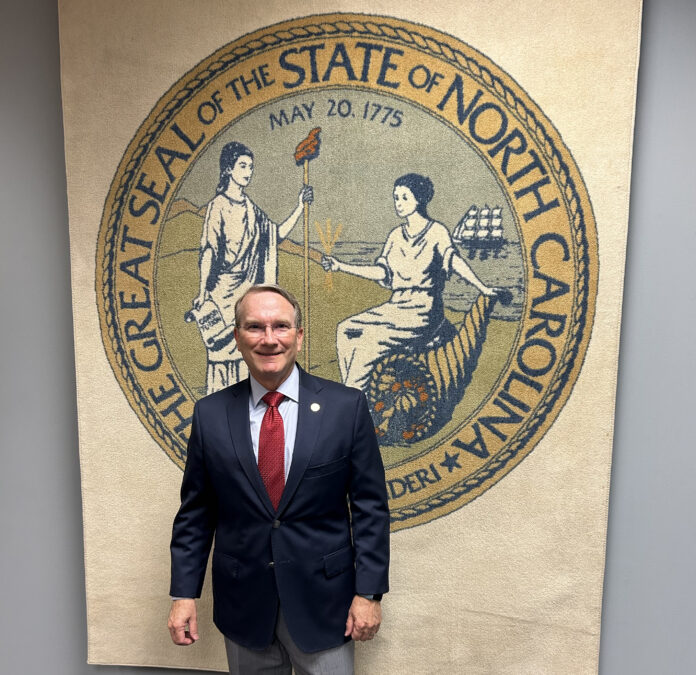Sen. Paul Newton of Cabarrus County sees legislative priorities as falling into two buckets: the short-term needs that arise quickly, and the long-term goals that he moves towards slowly and intentionally over many years. As the Senate Majority Leader, he handles both.
Sen. Newton sat down with NCLM in early September to discuss his approach to leadership, the 2023 legislative session, and his vision for the state of North Carolina.
˘˘˘
How’s the current session been? Has it matched expectations heading into the year?
PN: It’s been good in the sense of accomplishing some things that are really good for North Carolinians. It’s been longer than we would’ve liked. We had hoped to be done sort of July timeframe. But one of the things you learn when you’re here is that sometimes waiting is the very best thing you can do to get the best deal for North Carolinians. There’s a pressure to get it done quickly, but I’ve seen in the past that the one who is willing to wait the longest sometimes gets the best deal.
What are some of those things that you mention, that you’re most proud of?
PN: Well, the first one that pops to mind is a bill that solves a problem for our fast-growing counties. We have local government units that are under de facto moratoriums for new growth, new business, new homes, because they’ve run out of wastewater capacity. And that’s not literally true. They have plenty of wastewater capacity in terms of their brick and mortar. But the NC Department of Environmental Quality (DEQ) has had a process over the years where they have built multiple conservatisms into their calculations, and so they take away available capacity from just a bureaucratic perspective. This is the rule that was set back in the early 1980s. The rule is, if you’re going to build a new home, it’s going to be 120 gallons per bedroom per day. You have to take that away the very first day you get the permit even. And if it’s 500 homes, you got to take it all away day one from your brick-and-mortar wastewater capacity. It made no sense. So we got technical teams together, and went through a series of stakeholder engagements. DEQ was terrific. They were willing to basically acknowledge that with low-flow shower heads, low-flow toilets and what not, the wastewater calculation of 120 gallons per day is high. They agreed to reduce it to 75 gallons. Most engineers will tell you it’s probably closer to 45 gallons per bedroom per day, but we took the 75 as part of a compromise, and that unlocked tremendous value for local government units.
For example, Cabarrus County alone had $50 million of brick and mortar unutilized because the paper capacity took away their ability to use it. We had a moratorium in Cabarrus. But this was not a Cabarrus issue—this is a statewide issue for every fast-growing county. As soon as we got this bill passed, suddenly Cabarrus could use that $50 million worth of brick-and-mortar capacity. Now multiply that by every fast-growing county, and all of a sudden, those houses can be built to house the workforce that’s coming because of the new job creators to the fast-growing counties. The next job creator can come and know they have wastewater capacity and can actually build and utilize a building.
If you think about the economic value of that regulatory reform, I’m sure it’s in the billions of dollars for North Carolina. And the beauty of it is it didn’t cost anyone a penny. No appropriation, didn’t cost a dime. It’s just people coming together in good faith, looking at an old regulation and being willing to recognize it should no longer apply. Once we fix that, we’re rolling again and growing again in North Carolina.
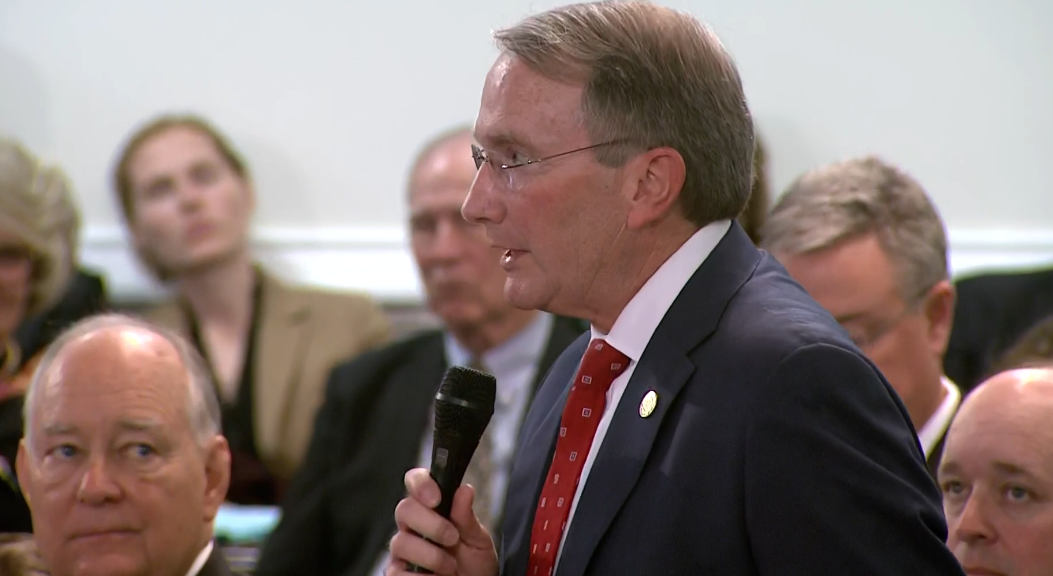 That’s a great example. It really ties in closely with the issues that arise at the League with the towns we serve. It’s often not the big flashy issues. Rather, it’s almost always related to water capacity and providing the foundation for new businesses and new homes.
That’s a great example. It really ties in closely with the issues that arise at the League with the towns we serve. It’s often not the big flashy issues. Rather, it’s almost always related to water capacity and providing the foundation for new businesses and new homes.
PN: That’s right. And as we speak right now, there is a group including DEQ meeting to look at water. Right now, the rules for intra-basin transfers are exactly the same as inter-basin transfers, even though they have very dramatically different potential environmental effects. And there’s a pretty uniform belief that intra-basin transfers should be able to be done more efficiently, quicker, more effectively, and at less cost than inter-basin transfers. And that’s what that group’s talking about right now. Now we’re trying to unlock water for local government units.
That gets to a question about legislative priorities and how they may have changed over your time in office, specifically thinking about that issue of growth—of exponential growth.
PN: I think of legislative priorities as two sets. One is a longer-
range vision. The second set is dealing with problems that have arisen while you’re here. So those change constantly. I didn’t come into this session thinking I would deal with wastewater capacity issues—it just arose. But the first category though, those are long-term. I have a long-term perspective on the prosperity of our state. We are a lifecycle state, right? You can be born here, you can go to a great school here in North Carolina, you can go to work and get a great job in North Carolina, and you can retire here and just have a great life with great amenities and quality of life being extraordinarily high.
You can’t get complacent about that. It’s always been my goal to create a regulatory and a tax environment that makes job creators want to come here. Eli Lilly is a good example. If we had the highest taxes in the southeast like we had in 2010, they probably wouldn’t have chosen North Carolina. But we don’t. We’ve been working on this for better than a decade and creating the kind of environment that companies want to put iron in the ground. They know they’re safe putting iron in the ground in North Carolina because we’re rational on a regulatory regime and that we have a very favorable climate for them to prosper. And what that means is that our next generation of North Carolinians are going to have a great job right here. They don’t have to leave. And as you know, you and I may be emotional about North Carolina. Are you from here?
I’m not from North Carolina originally, no. But I’ve been here for six years.
PN: Six years. Okay. Well, so you’ve been here long enough to know about the seashore and the mountains and everything we’ve got in between. And so we are emotional about North Carolina. But job creators are not emotional. They are counting the costs, looking at the benefits, thinking about whether they can look at the families they’re going to ask to move and be proud of where they’re going to bring them. And so to me, we’ve got to continue looking toward making North Carolina better for everyone, and job creators as well, because the minute we get complacent and say, ‘You know what? We’ve done enough. We don’t have to do anymore,’ then Tennessee, South Carolina, or Virginia will move past us and they’ll get the jobs we would’ve otherwise gotten.
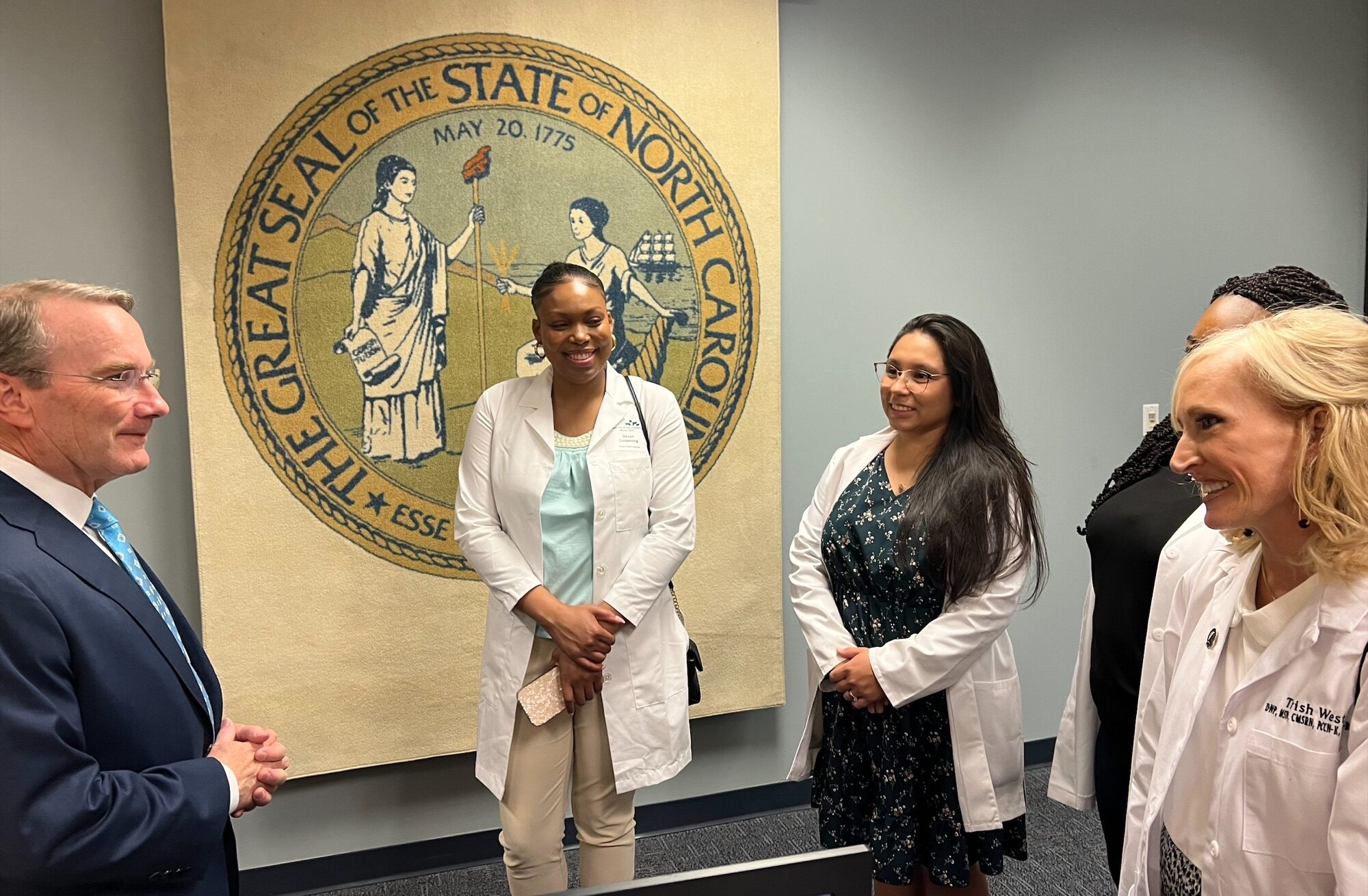 I like that term: a lifecycle state. That’s exactly right, I think. Does your background, your relationship with your hometown and your family—do those things inform that emotional connection to the state that you just mentioned?
I like that term: a lifecycle state. That’s exactly right, I think. Does your background, your relationship with your hometown and your family—do those things inform that emotional connection to the state that you just mentioned?
PN: I think it does. I grew up in a small town, Eden, North Carolina, which was Leaksville, Spray and Draper, and we’d ride our bikes all over the place and walk all over the place and always felt very safe and just had a great childhood there. Then spent some time in Greensboro, some time in Chapel Hill before I returned back to Eden to graduate from high school. Fond memories for sure. That definitely makes a difference. So yeah, I think that does create an emotional connection if you’re born here. And what we are trying to do is create an emotional connection with the CEO of the next business that’s thinking about North Carolina, where we’re competing with Ohio and Texas, and we want to make that emotional connection for them. And that’s where, to me, local government units play a huge role because when that CEO stays in a hotel, in that city, in that county where they’re thinking about relocating, I’ve told the travel and tourism industry, the hoteliers, they play an unsung role in economic development for North Carolina because they’re going to make an impression on somebody who stays there.
That hometown connections—we hear that so often with our mayors and councilmembers too. So many of them are from where they now lead. And yes, they lead rationally like you described, but the foundation of it is this pride for their town that they want to succeed so much. It’s one of this state’s great attributes.
PN: Yes. We have a lot of good local leaders, high quality local leaders in this state.
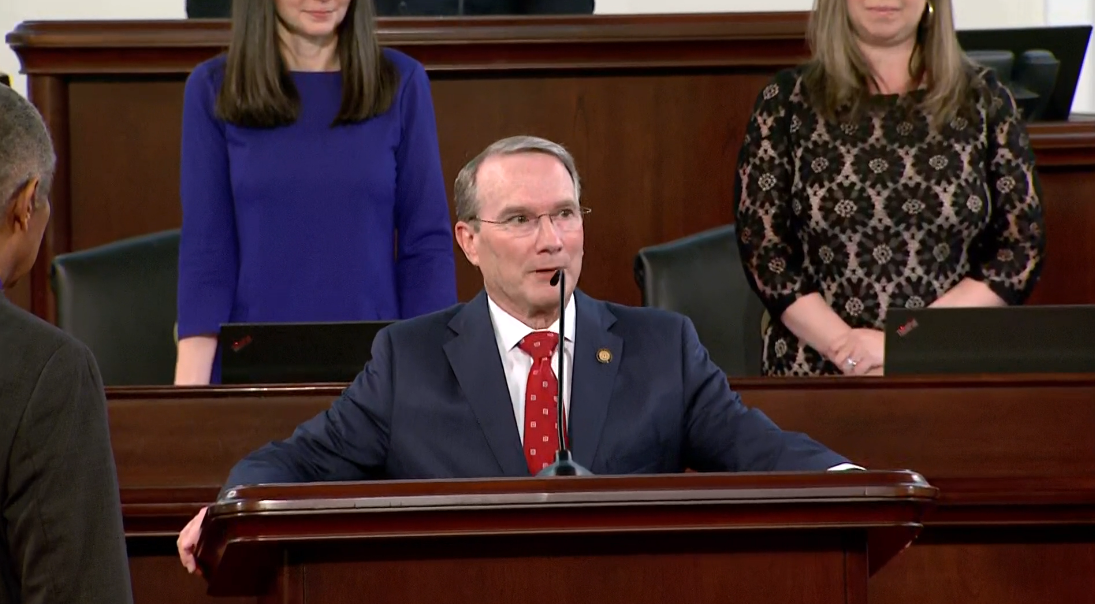 Growing up—going from Eden to Chapel Hill and then back home—were you always interested in holding public office?
Growing up—going from Eden to Chapel Hill and then back home—were you always interested in holding public office?
PN: So, I didn’t move back home after Chapel Hill. After Chapel Hill I actually went to New Mexico for five years, and then came back to North Carolina. And no, I’m not political by nature. I got involved in running for office because of personal asks that were made of me. My predecessor decided at the 11th hour back in late 2015 not to run for office. Surprised everybody. They scrambled to find a candidate. And I was asked by a number of people that I respect to consider taking it on. I had three people I ran against in the primary and then I won the general. I’ve been here for seven, going on eight, years now.
What was that process like? Deciding, ‘Okay, I’m going to do it,’ and then finding yourself in that first contested election?
PN: Well, it’s a different world than most of us walk in on a daily basis. And that’s a good thing. You have a range of personalities here. Some are very extroverted and ambitious politically. I’m more introverted. I love presenting and debating issues and whatnot—that doesn’t bother me at all—but I’m not a public person. I like to live quietly and out of the public eye. But sometimes life calls you into stepping out of your comfort zone to do things for other people. And that’s what this is for me. It’s just purely from a heart of service. And I’ve always said, as soon as there’s somebody better to represent Cabarrus County than me, then I will step away and I will support that person in running for my seat. I don’t have political aspirations. I just want to serve to the best of my ability and make the state better, make my county better, and the local government units there more successful.
It seems like there’s something to that style, and that this is a place that welcomes all sorts of different styles of leadership.
PN: It absolutely does. I think anybody can be successful. I think those that are really successful are putting constituents first. It feels like at the federal level, the government has forgotten who serves whom. We don’t serve the federal government. It wasn’t intended to be that way. The constitution reverses that. We are the people, the government is supposed to serve. And if you’re here as an elected official, remember that it’s not about you and it’s about the people you represent, I think that’s a theme that’ll take you to success.
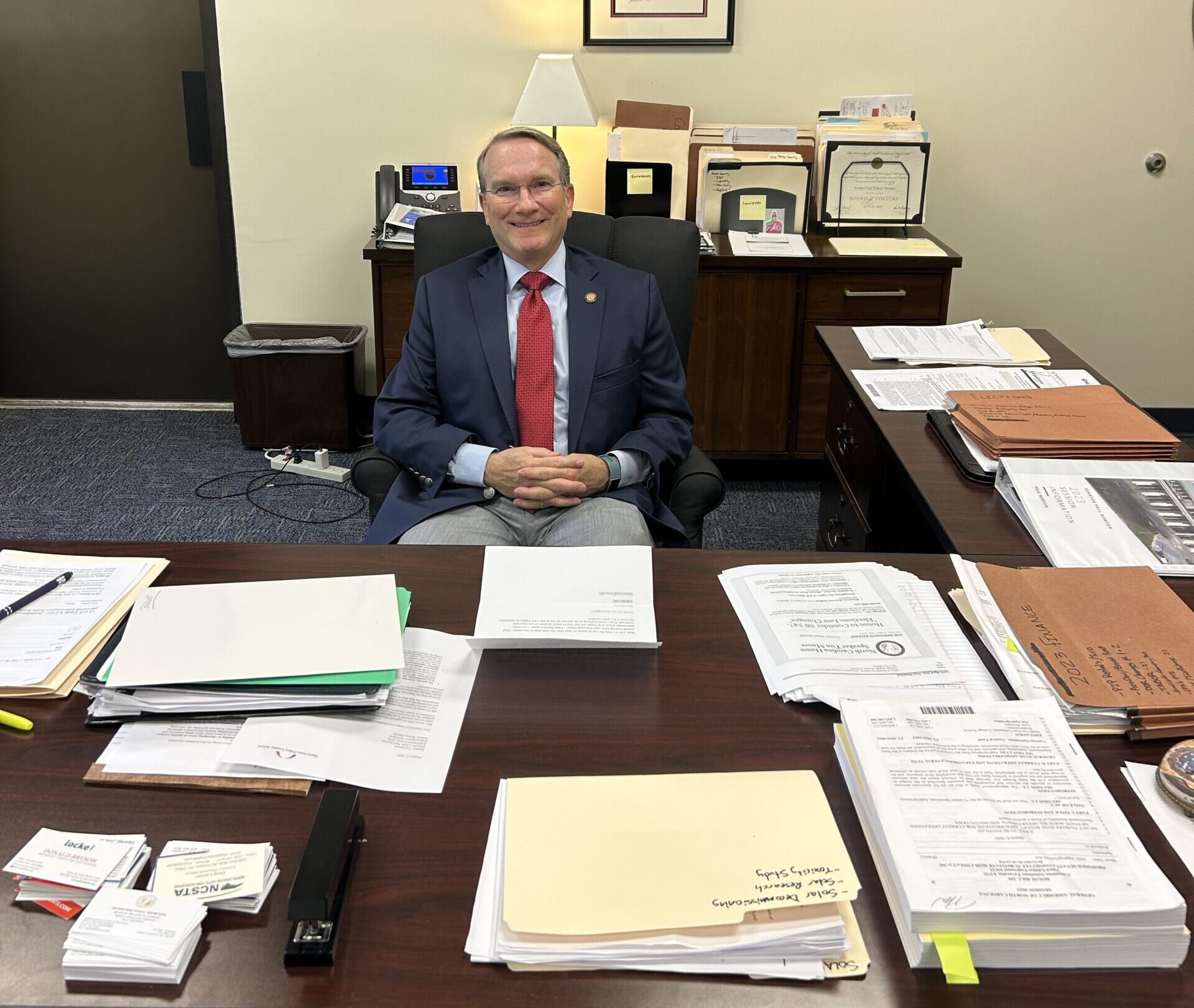 To wrap up, what do you hope for Eden, for Cabarrus County, and for North Carolina? What are your goals for it moving forward?
To wrap up, what do you hope for Eden, for Cabarrus County, and for North Carolina? What are your goals for it moving forward?
PN: I think government does have certain priorities. One is to create the kind of state that allows its citizens to prosper. That means doing the things that attract job creators and creating the infrastructure necessary for those job creators to come here. It’s important to keep people safe. When you talk to a mom on the street with two young children and they look around the country at some of the crazy things that are happening, those local government units have forgotten the paramount issue, which is safety of the citizens.
I think education is right up there as well. We have an obligation to meet kids where they are. And for my party, it’s been affording the opportunity for parents to choose the schooling that’s best for their children. That makes traditional public school proponents nervous. But I’ll never forget going to Union County, talking with a superintendent down there early on in my political career. He said, I asked all my principals, ‘How many of you have been to the charter school that’s so successful here in Union County?’ None of them had been. And he said, ‘Every one of you have got to go spend a day at this charter school, take their best practices and bring them back here to our public schools.’ That to me is the value of, you can call it competition. I don’t know if that’s the right word. I think the right word is, again, remembering who we serve. We serve those children, we serve those families, and we’ve got to meet a child where they are. And if it’s better for that child, we ought to be able to make that happen. That means supporting K through 12, and it means supporting higher education as well. And we do that well. We get criticized in the media as a party for allegedly not doing that. But if you look at the data, I mean, almost 60% of our budget goes to education. So we’re spending an awful lot of money. If you look at places like New York, there’s no correlation between spending per pupil and outcomes. We’re looking for outcomes.
I’ll tell you right now, don’t forget this: capital chases good ideas. If you’ve got a way to educate a child that makes them grow from wherever they came from educationally to a much higher place, you’ll get capital. You will get funded for that. People will want to be a part of that. But when you cross your arms and just say, I should be funded because I am, even though my school is failing, you can’t expect to get fully funded for that. I mean, you got to show this should be a meritocracy, just like the private sector is a meritocracy. And when superintendents and principals embrace that notion, that they’re no different than any other service for people, I’ll tell you, traditional public schools have so much to offer. They’ve got dedicated teachers, and that just needs to be pulled together and operated at an excellent level. And then the school choice issue will go away because everybody’s going to be very happy going to that local school.


